- Home
- Harlan Ellison
Spider Kiss Page 2
Spider Kiss Read online
Page 2
Stag Preston stopped directly in front of Shelly Morgenstern, his face buried in the towel. When he pulled it away the dark, penetrating eyes stared directly into the shorter man’s face. It was a good face, Stag Preston’s face, though in the eyes and in the cruel set of mouth, the stygian darknesses under the cheeks, there was the hint of something too mature, too desperate.
Now, as Stag shoved the towel under his shirt, wiping his moist armpit, the change would take place. Watch the remarkable, magical transformation, folks, Shelly thought. Watch as Sheldon Morgenstern, whose father was a cantor and whose mother had wanted her son to become a CPA, subtly undergoes a sea-change from publicity man for the great Stag Preston to pimp for the great, horny Stag Preston. Watch closely, folks, the degradation is faster than the eye.
“Shelly…”
Here it comes. “See one, Stag?”
The smile. The Motion Picture/Look/Life/Teen Magazine-famous smile guaranteed to contain 100% unadulterated sex appeal combined with bullshit. The smile, and, “A cutie, Shel. A little redhead down front with a ponytail. She’s got a sign says Stag Preston We Love You. Can’t miss her. She’ll be out in the alley. G’wan and round her up for me, how’s about, Shel.” There was no question in it; it was an order, despite the lisping, gentle Kentucky voice.
Sure, Stag. “Sure, Stag.”
Stag Preston made his way to the dressing room, and Sheldon Morgenstern made his way to the stage door. He paused to dump the old cigarette, light a fresh one, and open the huge metal door.
There they were. Growling, clamoring, straining for a sight of God on Earth. He watched them with the pitying scrutiny of a compassionate butcher, and found the little redhead. Stag had a good eye, there was no taking that away from him. She was too large in the chest for a kid her age, and the hair was a bit too brassy, but that was invariably the way Stag liked them.
He moved out into the crowd, reached her and tapped her shoulder. “Miss?” The wide, green eyes turned up to him, registered nothing.
“Miss, Stag would like to meet you.” He said it with no feeling, with, in fact, a definite absence of inflection in hopes she might be scared off. But they never were. Any of them.
Her breath went in like a train through a tunnel, fast and sharp and leaving emptiness behind it. “Stag? Me?”
He nodded. No encouragement, no deterrent.
She said something to a girl beside her, a fat girl with pimples (why did the best-looking ones always come with their comparison-friends, so they looked that much better?), and gave her the Stag Preston We Love You sign. Then she turned, with Roman candles in her eyes, and followed Shelly Morgenstern into the theatre.
Four years, he thought. Four years, and how did it all start? Was it that request from the Kentucky State Fair for Colonel Jack Freeport to judge the talent contest?
Had it started then, when they’d met Stag in Louisville? Or did it go further back, much further back to the days when Shelly had been trying to break away from the orthodox enslavement of his home, when he had discovered he could no longer believe in the terrible God of his father, and worshipped more easily at the heavenly throne of Success (and Money is his profit)? Did it go back to Jack Freeport, who needed more, more, more of everything…to rebuild a name that had been shattered as far back as the burning of Atlanta? Had it begun with hungers, or with simple supply-and-demand?
He knew how it had started.
And as he walked the little redhead into the lion’s mouth, he thought about it…about the four years.
Well tell it, then. Tell it, but make it quick.
We’ve still got three shows to do.
TWO
Great White Father and the ferret. That was how they looked from the corner of the eye, in that side-of-sight glance hurriedly thrown by people at airports. First came the big man in the white linen suit. He paused at the head of the aluminum stairs, mopping his desert brow with a monogrammed handkerchief.
Even as his hand came away from his face, the armpits of his white-on-white shirt darkened through with perspiration. Almost maliciously, he turned his face up to the sun, and the Louisville heat greeted him inhospitably.
“Cursed state,” he muttered, “always said it should have been plowed under by God.” He spoke with a thick Georgia accent, a touch of nobility, a touch of arrogance.
He was big in small ways. His face was almost leonine, with a snowy nimbus of hair capping his massive head splendidly. His hands were blocky, yet had a suppleness suggestive of fine Swiss watchmaking or brain surgery. He stood momentarily, staring from bleached-out eyes—the image of Great White Father—framed against the open port of the big Eastern Convair 440; he surveyed the crowd jammed against the fence.
With a satisfied tone he called back over his shoulder, “Wharton sent no one, Shelly. I don’t see any badges from the fair.”
Then he deplaned from the twin-engine Silver Falcon.
Behind him, squinting, the wiry Palm Beach-suited ferret shied from the gagging humidity. It was not so much the olive coloring of his lean, hard face as the diamond-intensity of his black eyes that gave the impression of stealth…deviousness…attentiveness. He cursed softly, a Manhattan twang, and gripped the strap of the thin, cabretta-grain attaché case more tightly. It did not swing idly from his left hand. Shelly Morgenstern hurried after the older man.
Almost before they had passed the hurricane fence with its strict admonition of
GASOLINE FUMES
NO SMOKING
DANGER!
the younger man had forked a cigarette from his lapel pocket and had wedged it between his lips, firm in a corner of his thin-lipped mouth.
Even inside the terminal building of Standiford Field the heat was monstrous. The big man stopped abruptly and leaned against the wall. He mopped at the perspiration on his jowls. “Shelly,” he said snappishly, “give me one of those cursed tablets.”
The ferret jammed the attaché case between his feet and fumbled a small plastic vial from a jacket pocket. Unsnapping the lid he tumbled a pale blue tablet onto his palm, and extended it to the older man. “Water fountain up the line, Colonel,” Shelly said, jerking his head in the direction.
Laboring under his bulk—not fat, just girth—Colonel Jack Freeport (Savannah, New York, Cannes and London) made it briskly to the fountain, popped the tablet onto his tongue and washed it down with irregular gulps of water, managing to avoid spilling on his jacket.
“I’ll see to the bags,” Freeport said, straightening. “You call George Wharton at the State Fair Headquarters, and under no circumstances are we to be bothered by their sending some incompetent down to drive us. I want to get cleaned up and rested from that cursed plane ride, without having to meet anyone.” He waved an imperious hand in the direction of the phone booths. Then he moved off toward the baggage claiming area.
Shelly stared after the imposing figure of Jack Freeport, and the muscles along his lean jaw jumped. For an instant he felt like a toady. He had felt that way before. He disliked the feeling intensely. Then remembrances of debts, his unpaid balance on the Mercedes-Benz, what it cost to maintain Carlene…and the twenty thousand a year Freeport paid him…came back to him and he struck off for the phones.
He dropped the attaché inside the booth, against the wall, and slid onto the seat. From a list of numbers in his wallet he dialed a downtown Louisville exchange, and waited. Traffic moved past the booth in both directions.
When the dial tone broke and the husky feminine voice said, “Kentucky State Fair Headquarters,” he was not quite prepared, and for an instant fumbled his silence.
“George Wharton, please,” he said finally.
“Whom shall I say is calling?”
“Colonel Jack Freeport.”
There was a soft, furry click and silence at the end of the line. Shelly flicked ash from the dwindling cigarette in his mouth, without removing the butt from between his lips.
Another click and a voice said, “Jack! When the hell’d
you get in, boy?”
“This is Sheldon Morgenstern for Colonel Freeport, Mr. Wharton. We’re at Standiford—”
Wharton blustered forward with his interruption: “I’ll have a car right out there for you, fella, just hold on a min—” He turned away from the mouthpiece and shrieked at someone, “Teddy! Teddy, get your coat on and take the Buick. Freeport’s at Stan—”
Shelly cut him off with a loud, “Hold it, Mr. Wharton.”
George Wharton came back to the receiver from the Land of Speedy Activity. “No trouble, no trouble at all, Mr. Morgenstern. Have a car out there in fifteen minutes. We’ve got a bunch of hangers-on around here, anyhow. They don’t do a damned thing all day but mooch from petty cash. Let me send someone out for you.”
Shelly was adamant. “Don’t bother, Mr. Wharton. Colonel Freeport is a little tired from the flight and wants to go directly to his hotel. Where have you booked us?”
“The Brown, but—”
“We’ll take a cab to The Brown, then. The Colonel will give you a ring from the room when he’s settled. Is there anything on for tonight?”
Wharton sounded unhappy, but answered, “Just a dinner, but that isn’t until nine or nine-thirty. Say are you sure—”
Shelly felt the conversation had exhausted its meager limitations and said, “All right, then, Mr. Wharton, we’ll call you as soon as we’ve gotten settled. Thanks a lot. Goodbye.” He dropped the receiver without waiting for a reply.
Freeport was already leaving the baggage area, the suitcases going on before under the arms of a red cap. He turned as Shelly approached, and a questioning expression bent his features.
“What did he say?” he asked.
Shelly lit a fresh cigarette from the butt of the one before and answered, “He wanted to send out a car; I told him we wanted to make it on our own.”
Freeport snorted. “They’d take us down to the Headquarters and before I’d even gotten a bath—some Momma would have her little Agnes tapping and bawling at me. These cursed talent contests are all the same. Where are we staying, The Brown?”
Shelly nodded. “At least we’ll have good rooms. No money in this, but I suppose it’s good relations. Any plans for Louisville, Colonel?”
Freeport pursed his lips, shrugged the question away. “Well, Shelly, we’ll see, we’ll see.”
They followed the red cap to the line of waiting cabs and settled themselves for the ride into Louisville. “The Brown,” Shelly advised the hackie. When the bags were loaded, they pulled away, and he settled down, closing his dark eyes. Freeport continued to squint, even in the absence of sunlight. He mopped at his face and neck constantly, with nervous, spastic motions. “Cursed state,” he muttered once.
Shelly considered what Freeport had told him about this untimely, uncomfortable trip to Louisville. The taxi, weaving down the expressway, was so close Shelly felt as though he was knotted into a bag, and the cab smelled faintly of urine. It added to the ease of contemplating what Jack Freeport had said about misplaced loyalties.
Because of the lack of foresight of his parents, some fifty-three years before, of having resided in Cadiz, Kentucky, on the day of his birth, Freeport was—at least technically—a native son. Despite the fact that the family had been recouping drastic financial losses and had moved back to Savannah three months after Freeport’s birth, the Kentucky State Fair committee had still seen fit to call on him to judge their abominable talent show.
After all, thought Shelly, first comes Sol Hurok, and then comes my big twenty thousand dollar a year meal ticket, Colonel Jack Freeport.
Savannah, New York, Cannes and London.
Amen.
So we are in Louisville, Kentucky. Shelly dropped the thoughts like pigeon excretion. Navel of the nation. And we are preparing to judge a Talent Show (cast of thousands…all nonentities). While back in New York that damned jazz show needs a shot of digitalis, in Chicago the poetry readings are drawing about as well as a Sunday picnic at Buchenwald, and in L.A. the Go-Kart races are about as popular as an acrobat in a polio ward.
Everything was dying on the vine. And here we sit warm and cuddly on the same vine, in Louisville. Say one for me, Agnes, we’ll all be in the soup line tomorrow.
“But well-dressed,” he murmured under his breath.
“What was that, Shelly?” Freeport turned from the view outside the taxi.
“Nothing, Colonel. Nothing at all,” he answered, without opening his eyes. Not a damned thing, Massah.
Beyond the cab, the red loam of a housing project-in-progress swept past like a raw, naked wound in the arid flesh of the land.
As they pulled into the center of town, Shelly sat up in the seat, and tried to shrug some composure—lost during the flight and this heat-assault since the airport—into his wilted frame. It didn’t do much good. It was no use; he resigned himself to a weekend of heat, boredom and too-sweet martinis.
Fourth and Broadway. The Brown Hotel.
The bags were carried by an old man whose black pants had two distinctive attributes: a red stripe down each leg, and several hundred thousand wrinkles. A butter stain adorned the uniform tie.
Colonel Jack Freeport marched through the lobby, signed in with a maximum of notice while Shelly limply autographed a check-in card, and made the sanctity of his suite without undue delay. Once in the air-conditioned sanity of his room—separated from Freeport’s by a sitting room of unparalleled dinginess—Shelly stripped off his jacket, shirt and tie, threw them across the bed, and bare-chested, crucified himself before the cool air ducts of the big Fedders.
“Shelly,” the call came from Freeport’s room, “let me have the attaché case.”
The flak-man ran a hand through his dark hair and retrieved the leather case from where he had dumped it on a big Morris chair. He carried it through the sitting room and into Freeport’s bedroom.
The Colonel was stripped to fancy nylon shorts, dark socks and shoes, the garters tightly clinging to thick, hairy legs. Shelly was once more—as always—startled by the hard-muscled, trim condition of Freeport’s big body.
“Fetch me those papers on the key clubs, will you, Shelly?” He said it over his shoulder as he lifted the big three-suiter onto the bed and unsnapped it.
“I think you’d better call Morrie in New York, Colonel, and find out how he did with MCA,” Shelly said.
Freeport nodded without turning around. “Good idea. Get him for me.” Shelly shook his head feebly, in resignation, and picked up the receiver.
After an interminable wait: “I want to call long distance, operator, New York City, MUrray Hill 2-4368, person-to-person to Mr. Morrie Needleman.”
When the call went through, a bored, “Yeah, this is Needleman, go ahead,” at the other end greeted him.
“Morrie? Shelly in Louisville. The Colonel wants to speak to you.” He handed the receiver to Freeport, who continued brushing his hair with one hand while he fastened the instrument to his head with the other.
“Hello, Needleman? Did MCA come through for us?”
The eternally-weary voice of Morrie Needleman, entrepreneur second-grade, raced down the wire…slowly. “Yessir, but they asked for more for Satch so I met ’em halfway.”
Freeport scowled. “You went beyond your authority, Needleman. How much more?”
“Another three yards, Colonel. That was as low as they’d show.” He paused a moment, seeing his job fly South for the duration. “I tried to do better’n that, Colonel, but they had us over a barrel. We’d already announced Armstrong; papers, radio, billboards.”
Colonel Jack Freeport scowled more intensely. “Well, hmm-hmm. All right, Needleman. No real harm done, I suppose. We’ll make it up at the box office.” He handed the phone back to Shelly.
Morgenstern took over as though he were merely a surrogate for the older man. “Morrie? Shelly again. Listen, baby, sit on the damned concert till the sonofabitch’s SRO. So meanwhile, how’s everything else? What d’ya hear from L.A.?”
&nb
sp; The faint rustle of paper came from the New York end of the line, and Needleman’s absorbed, “Ummm,” filtered down with it. Finally, as though he had been consulting briefs, Needleman said, “I’m going to call Buddy Halpern out there and get him to pull off a stunt. Maybe soup up one of them Go-Karts and drag the L.A. cops down the main stem. Get the papers on it, and we might have the in we need.”
“Wild, baby,” Shelly said blithely, “keep us posted. We’ll be back by Sunday night the latest.”
Needleman’s lazy voice lost its business edge. “Anything shakin’ down there?”
With a disgruntled grunt Shelly replied, “Sure, sure. The whole damned town’s a bacchanalian orgy. At least I’ll be catching up on my sleep. So long.” A reply, and he hung up.
As he turned, Freeport said softly, “Mark it down to let Needleman go, Shelly.”
That easy. Five years with Freeport, and mark it down to let him go. It was always that easy with the Colonel. I’ll mark it, Boss Man. I know the Bible says you’re a jealous people. “Yes, sir,” he said.
While Freeport pored over the proposed plans for a nation-wide chain of key clubs to be leased by major sports figures under their names (but run through Freeport’s holding company, with gigantic kickbacks to Freeport’s syndicate), Shelly returned to his room, visions of showers dancing in his head. He tried not to think of Needleman and his wife’s breast cancer.
The shower was cold and sharp and good, and when he had toweled himself pink (like a baby shrimp, he amused himself), he returned to his room, the towel around his waist. He surveyed himself in the full-length mirror, ignoring the slight protuberant bulge of his stomach, and struck a wholly ineffectual Muscle Beach attitude.
“I can do the Mr. America bit with either arm,” he told his reflection, pressing first one fist to his temple, then the other, while maintaining a ferocious expression.

 Repent, Harlequin! Said the Ticktockman
Repent, Harlequin! Said the Ticktockman Broken Glass
Broken Glass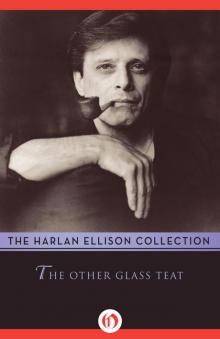 Other Glass Teat
Other Glass Teat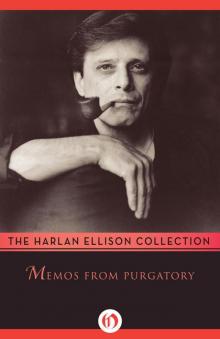 Memos From Purgatory
Memos From Purgatory I Have No Mouth and I Must Scream
I Have No Mouth and I Must Scream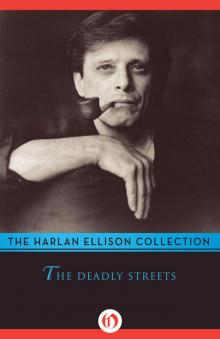 The Deadly Streets
The Deadly Streets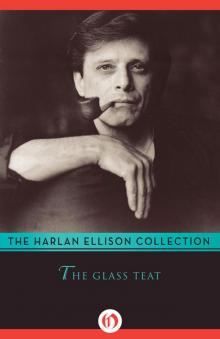 The Glass Teat
The Glass Teat Paingod and Other Delusions
Paingod and Other Delusions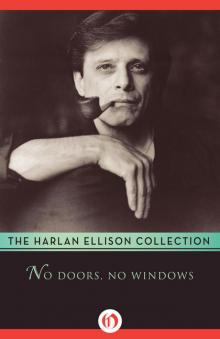 No Doors No Windows
No Doors No Windows Strange Wine
Strange Wine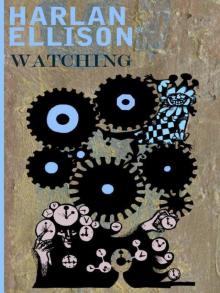 Harlan Ellison's Watching
Harlan Ellison's Watching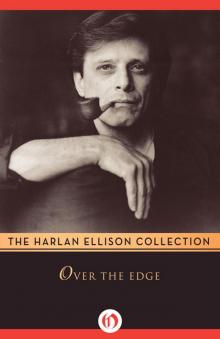 Over the Edge/An Edge in My Voice
Over the Edge/An Edge in My Voice Troublemakers: Stories by Harlan Ellison
Troublemakers: Stories by Harlan Ellison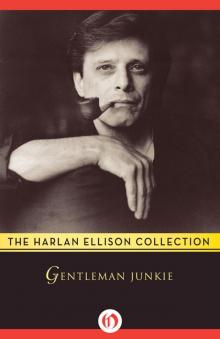 Gentleman Junkie and Other Stories of the Hung-Up Generation
Gentleman Junkie and Other Stories of the Hung-Up Generation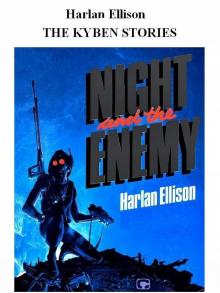 The Kyben Stories
The Kyben Stories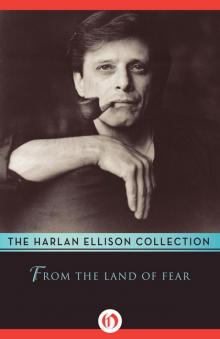 From the Land of Fear
From the Land of Fear The Top of the Volcano: The Award-Winning Stories of Harlan Ellison
The Top of the Volcano: The Award-Winning Stories of Harlan Ellison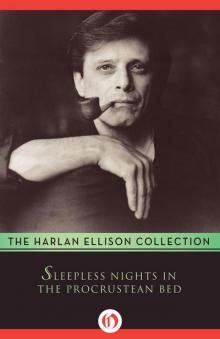 Sleepless Nights in the Procrustean Bed
Sleepless Nights in the Procrustean Bed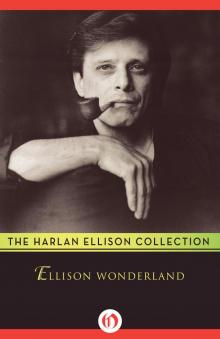 Ellison Wonderland
Ellison Wonderland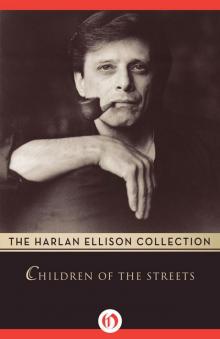 Children of the Streets
Children of the Streets Can & Can'tankerous
Can & Can'tankerous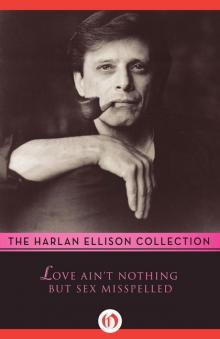 Love Ain't Nothing but Sex Misspelled
Love Ain't Nothing but Sex Misspelled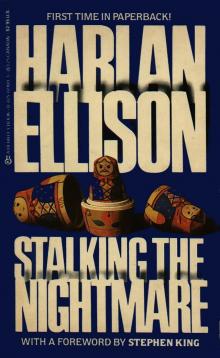 Stalking the Nightmare
Stalking the Nightmare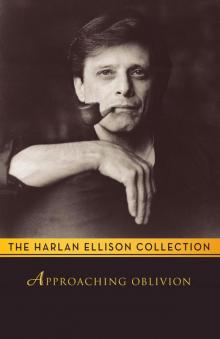 Approaching Oblivion
Approaching Oblivion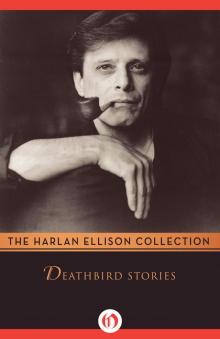 Deathbird Stories
Deathbird Stories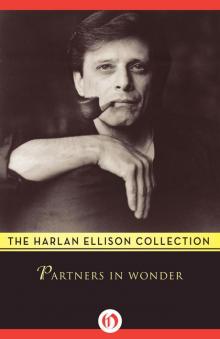 Partners in Wonder
Partners in Wonder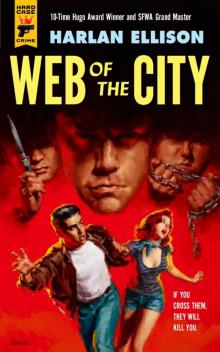 Web of the City
Web of the City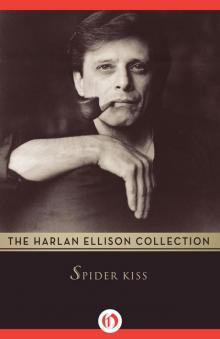 Spider Kiss
Spider Kiss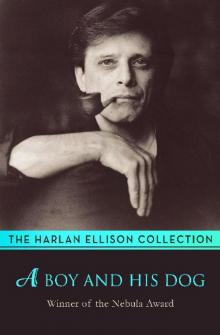 A Boy and His Dog
A Boy and His Dog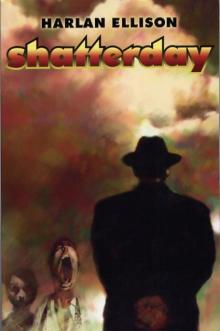 Shatterday
Shatterday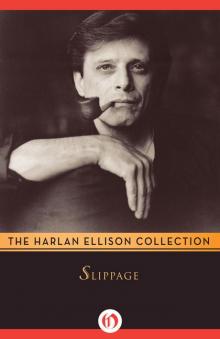 Slippage: Previously Uncollected, Precariously Poised Stories
Slippage: Previously Uncollected, Precariously Poised Stories Repent, Harlequin! Said the Ticktockman
Repent, Harlequin! Said the Ticktockman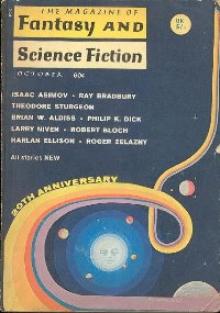 Come to Me Not in Winter's White
Come to Me Not in Winter's White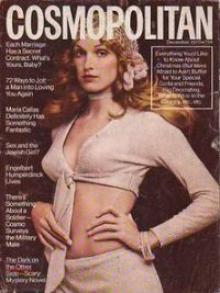 The Song the Zombie Sang
The Song the Zombie Sang The Other Glass Teat
The Other Glass Teat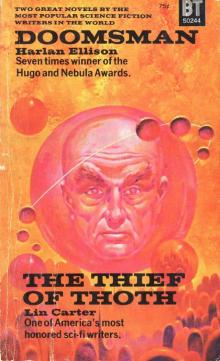 Doomsman - the Theif of Thoth
Doomsman - the Theif of Thoth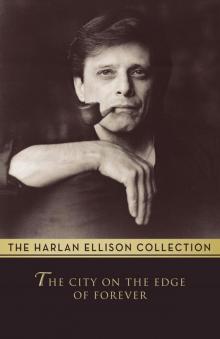 The City on the Edge of Forever
The City on the Edge of Forever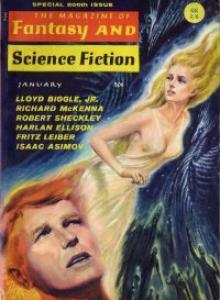 I See a Man Sitting on a Chair, and the Chair Is Biting His Leg
I See a Man Sitting on a Chair, and the Chair Is Biting His Leg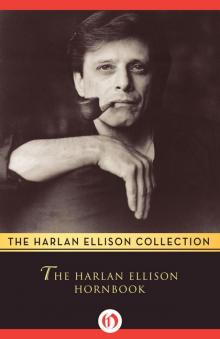 The Harlan Ellison Hornbook
The Harlan Ellison Hornbook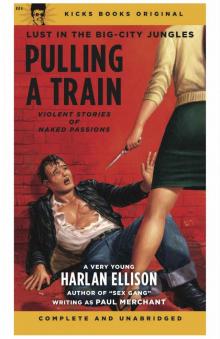 Pulling A Train
Pulling A Train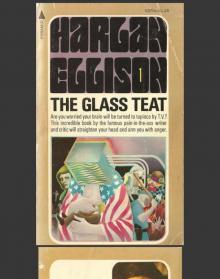 The Glass Teat - essays of opinion on the subject of television
The Glass Teat - essays of opinion on the subject of television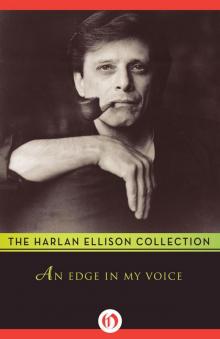 An Edge in My Voice
An Edge in My Voice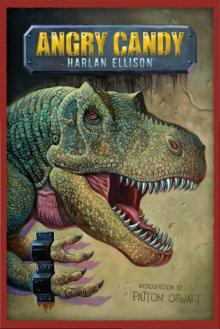 Angry Candy
Angry Candy Troublemakers
Troublemakers The Top of the Volcano
The Top of the Volcano Over the Edge
Over the Edge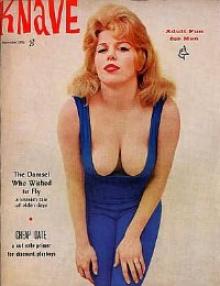 Survivor #1
Survivor #1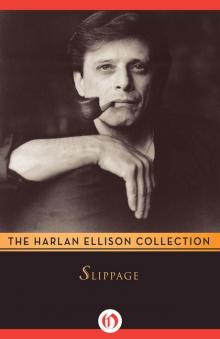 Slippage
Slippage